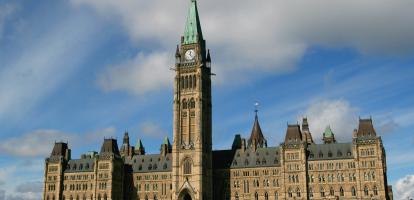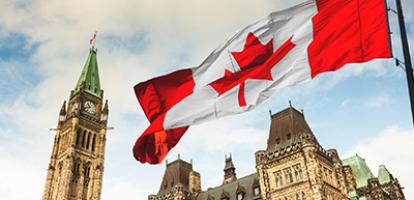As we watch the American election drama unfold, Canadians are generally positive in their view of Joe Biden’s candidacy and the prospects of the defeat of Donald Trump in November. Mr. Trump has been unpleasantly aggressive in dealing with Canada, not only on trade but regarding the broader political relationship, as well.
Mr. Trump described NAFTA – negotiated by a previous Republican administration – as the worst trade deal ever, claiming Canada had been ripping off the U.S. for decades. The trade renegotiations with the Trump team were tough and unpleasant. Most recently, Mr. Trump reapplied import surcharges on Canadian aluminum, citing concerns about national security. There were those personal insults directed at the Prime Minister after the 2018 Charlevoix G7 summit.
White House trade adviser Peter Navarro repeated unalloyed insults toward Canada in his new book on Mr. Trump’s foreign policy and in a recent CNN interview.
All of this has reinforced a strong Canadian desire to see the return of a more respectful and productive bilateral relationship under a Biden presidency.
On the global stage, Mr. Biden would begin restoring the U.S. to a position of international commitment and leadership, reversing the unilateralism of Mr. Trump’s America First agenda. As the Washington-based Center for Strategic and International Studies said earlier this year, contrary to Mr. Trump’s disdain for global alliances, Mr. Biden “unashamedly embraces a U.S.-led, rules-based international order with an emphasis on reducing trade barriers and setting global trade standards.”
All of this has reinforced a Canadian perception that the Democratic Party is an easier group of folks to deal with, the Democrats sharing much of the same world view as Canada. Some of this has merit. But it is important to temper this with the hard realities of American politics and the driving factors in the U.S.-Canada bilateral relationship.
No doubt Canada punches above its weight in Washington, due to carefully honed strategies and the myriad of mature connections we have throughout American political, business and social levels. However, there are limits to the influence Canada can ultimately bring to bear in Washington, whatever the political complexion of the administration or whatever party is ascendant in the Congress.
To begin with, there’s a strong anti-free-trade sentiment in the Democratic Party, even with Mr. Biden’s embrace of multilateralism and open markets. This is partly due to the influence of organized labour, such as the United Auto Workers, which was a steadfast opponent of NAFTA and other deals such as the Trans-Pacific Partnership.
Leading Democrats, such as Bernie Sanders and Elizabeth Warren, hated NAFTA and campaigned against it. Hillary Clinton said she would renegotiate the agreement when she was running for president. When he was a congressman, Mr. Sanders even tabled motions urging U.S. withdrawal from the World Trade Organization.
It’s worth remembering that it’s often Democratic politicians from border states that have been the most critical of Canada and difficult to deal with in terms of bilateral trade. As an example, over many years when he was chair of the Senate finance committee, former Democratic senator Max Baucus of Montana constantly railed against what he said was unfair Canadian softwood-lumber imports.
So while the tone may change under a Biden presidency, there will be ongoing trade tensions of greater or lesser intensity, some being elevated to full-blown trade wars. Witness the perpetual softwood-lumber dispute targeting Canadian imports, running for more than 35 years, relentlessly waged whether Republicans or Democrats have been in office. This dispute rages on, with the most recent WTO decision in Canada’s favour released last week.
Underlying this tough stand is the iron-clad U.S. adherence to its trade remedy laws, meaning the ability to slap anti-dumping and countervailing duties and, when desired, various forms of import restrictions. While ostensibly stemming from WTO-agreed rules, the U.S. has created its own complex and unforgiving trade remedy system. These laws are sacrosanct, enjoying virtually unassailable bipartisan support.
None of this gainsays the fact that a Biden administration would bring a reversal of the aggressive belligerence and unilateralism in Trump’s foreign policy. There would be an end to the weaponizing of unilateral tariffs, although not necessarily a complete reversal when it comes to China. But over all it can be expected that Mr. Biden would abandon Mr. Trump’s unbridled use of national-security surcharges to hit out at allies.
That being said, no Democratic president or Congress will restrain deployment of U.S. trade laws by American companies combatting imports of goods or services claimed to be unfairly priced. No Democratic administration will refrain from using those laws to counter attempts by foreign governments, including Canada, to tax American digital service providers.
So while Canadians take comfort in the possibility of Donald Trump going down in flames in November, it would be naive to expect a diminution in use of American trade laws as one of the main weapons of U.S. policy. It means Canada will be as much in the crosshairs as any other country, even with the Democrats in control.
Published in the Globe and Mail
Lawrence Herman, a former Canadian diplomat, is counsel at Herman & Associates and a senior fellow of the C.D. Howe Institute.





